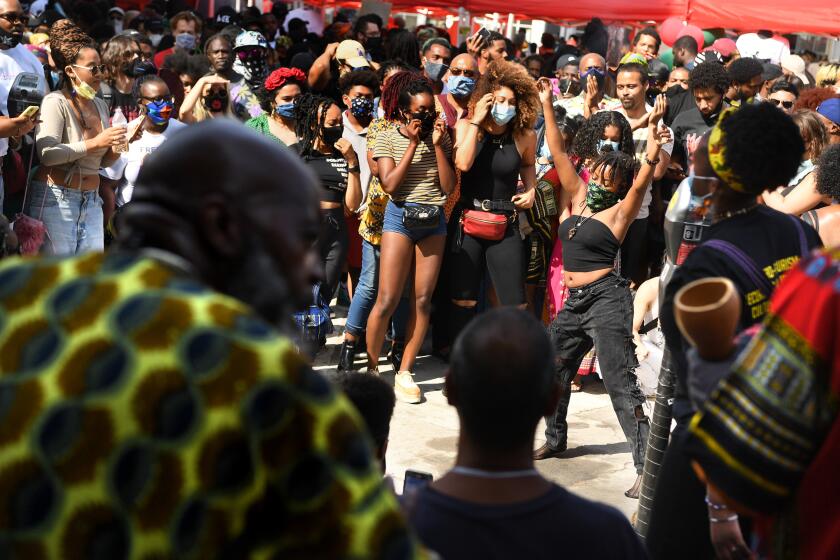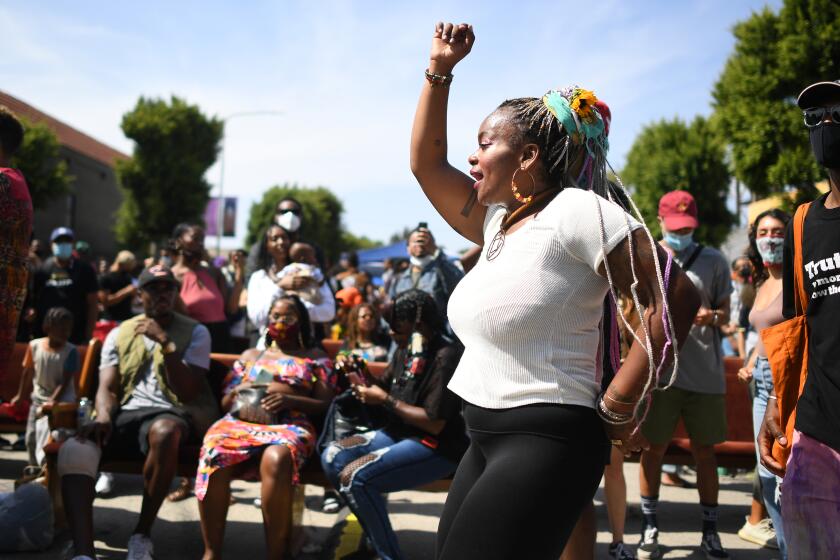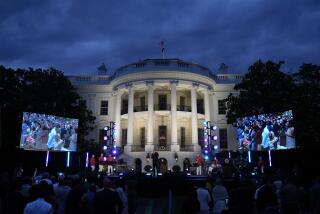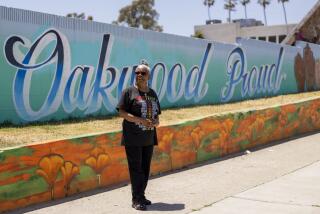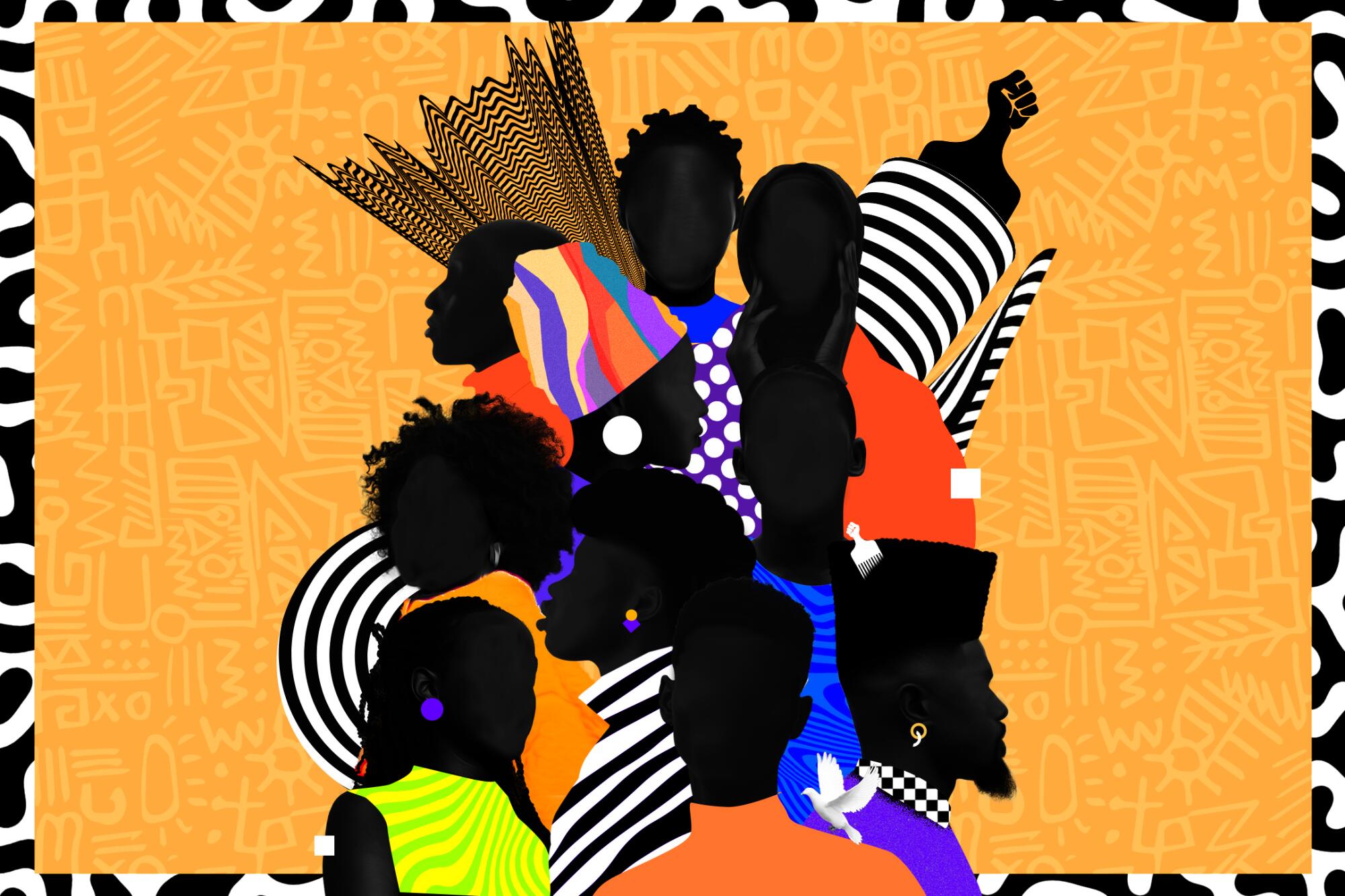
- Share via
There are two ways people learn about Juneteenth: They seek it out or it finds them.
For some, Juneteenth is a recent revelation. Last year’s anti-police brutality protests in the wake of George Floyd’s murder sparked anti-racism activism, Black pride, support for Black businesses and a desire to learn more about Black history in the United States. The combination of increased advocacy and the hardships of the COVID-19 pandemic made celebrating Juneteenth more important than ever.
From Leimert Park’s annual celebration to Segerstrom’s first year of festivities, commemorations of Juneteenth will feature Black art across the region.
But for many Black Angelenos, Juneteenth has long been a reason to celebrate, to remember. Maybe they grew up with red punch, barbecue and an understanding of the significance of June 19, which commemorates the day in 1865 when enslaved people of Texas finally learned that slavery had been abolished and that they were free. Perhaps their families carried the traditions with them as they migrated north and west from Galveston, Texas, where the holiday originated, and the surrounding states.
In 1948, businessman and Texas native Jonathan Leonard moved to Los Angeles. “Come June 19th of 1949 I asked, ‘Why is everybody going to work? Why are the banks open?’” Leonard told The Times in 1997. “I couldn’t believe it.” His family joined with others in the community to start hosting Juneteenth celebrations in Leimert Park.
As we head into what promises to be one of the biggest Juneteenth celebrations Los Angeles has ever seen, we asked Black Angelenos to tell us about their first time celebrating the day and what it meant to them.
People shared memories of joy, good food and feeling a sense of community. They talked about spending the day with their parents and families, and about the special place 2020’s celebrations held. And they shared that the day is about celebrating freedom but also recognizing and honoring everything that Black Americans have endured, overcome and accomplished in the 156 years since the original Juneteenth.
These responses — a combination of interviews and email submissions — have been condensed and edited.

We honestly celebrated Juneteenth every year growing up. My mom was very serious about traditions, especially Black ones, and making sure I knew the importance of our history as Black people. We lived on 42nd Street in Leimert Park, and we would walk to Degnan Boulevard for the celebration. There was usually a farmers market happening, African dances and happy Black people everywhere. It was always one of the best days of summer for me. Super excited that the tradition has become more mainstream and more African Americans are celebrating our day of freedom.

There was the Delaware Juneteenth Assn. that was basically organizing events around the holiday, and the pageant was the newest part of it. My mom put me in because she was really into getting me into any kind of cultural-extracurricular-community-type thing. It was a months-long journey leading up to it, a lot of learning about the history. Delaware in particular was a stop on the Underground Railroad, so there was this Harriet Tubman reenactment that was also happening. Just a very cultural and historically rooted prerogative with the whole association.
Then there was some of the typical pageant stuff. Teaching young girls etiquette, stuff like that. We all had a talent portion. We had a couple of group dance routines; I remember a lot of Bill Withers. I did the Langston Hughes poem “Dream Variations.”
I was so nervous but just held it together and did it, and I was really proud afterward and happy. And then winning — I just felt like, “What the hell? Wow.” Even though there was so much culture absorbed in the things leading up to it that were really enriching, when you’re 9, it’s kind of like: “Oh, I won something.” It wasn’t until much later that I was like, “Wow, that was something really, really, really unique and special.”

Last year, I was celebrating Juneteenth in Leimert Park. That was in the midst of COVID, so it was maybe the second or third time I had been out of quarantine in general. That energy was in the air, plus the protests had just happened for George Floyd in Los Angeles.
Thousands showed up for Juneteenth festival in Leimert Park, a seven-decade tradition
It was a blissful feeling, because we were all here celebrating each other at a time where if we didn’t, we really wouldn’t have anyone celebrating us. Then just seeing people you haven’t seen [for] some time because of the pandemic, seeing the older generation out there.
In those moments, I like to photograph or just walk around and be a fly on the wall. It was just good to see people shopping with the vendors, laughing and joking, dancing to the music that was playing.
It just felt like that little pocket of time was one of those summers from your childhood. Everybody’s just having a good time, and it was a sense of community. A lot of unification in that moment.

This is not my first Juneteenth memory, but last year was definitely my most special. It was the first time I organized a virtual event for Juneteenth called the Cookout. We had a lineup of talented Black creatives performing poetry and music. I co-hosted it with my friend Jasmine. We discussed important Black issues between sets. It was extremely fulfilling to be able to put on my own virtual event, plus also attending the Pray for the Hood in-person event in Leimert Park on the same day. We ate good, shopped good, laughed good and truly celebrated being Black. It will forever be the best memory.

I attended a Leimert Park Juneteenth celebration in the mid-’90s. I remember it vividly because I met Reginald VelJohnson there and [his sitcom] “Family Matters” had just ended.
I was with my father and the Winter Fox ski club, of which he was a member. They had very similar food vendors to the African Marketplace. I distinctly remember the drum circle that formed throughout the park and eventually the fountain. It felt like the entire neighborhood came out to celebrate. It’s my earliest memory of learning about Juneteenth at all.

The first Juneteenth I celebrated was last year. It sounds bad, I know, but last year, there was just so much going on in the world with the pandemic and Black Lives Matter movements and shootings that we just needed to take a day to appreciate being Black and celebrate our culture by coming together. So a couple of my brothers and I decided to put together a Juneteenth barbecue at the park and invite all our friends and family to celebrate the best way we knew how.
The experience was amazing. In fact, it has become an annual thing for us, and we are doing it again this year. Juneteenth means a time of coming together and appreciating our heritage and culture, a time of celebration and liberation, a time of laughter, good food and love.

I went to the festival in Leimert Park. It was a bunch of Black-owned vendors. Literally everything — Black-owned snow cones, Black-owned food, Black-owned balloon company.
My family’s so big on African things, Black everything. My mom, she makes African dolls for June 19. My grandmother’s from Texas. She taught her [that] Black people are powerful. I believe that. We are so powerful.

Jonathan Leonard used to have the celebration of Juneteenth right there in Leimert Park. He would give out free watermelon slices and ribs all day long, because that’s part of the Juneteenth tradition. I was taking pictures for the L.A. Watts Times. It was in the ’90s, between ’90 and ’95.

My family on my mother’s side — they’re from Texas, and they never talked about Juneteenth. I’ve never heard about it from them.
I first learned about it in 1985. It was the summer. I was in Dallas for a convention and I met a local person there. He goes, “Oh, you guys are here a good weekend. It’s actually Juneteenth.” And I’m like, “What’s that?” I had no idea what he was talking about. I don’t remember going to any event that weekend because it was so busy. I was doing so much other stuff. It really wasn’t until probably later that I went to an event, maybe several years later.

I don’t have many memories because I never really knew about Juneteenth. I grew up with public school, and Juneteenth was never in the curriculum. But once I got to college, I heard about Juneteenth and I was like, “Oh, this is super dope.” To celebrate our independence, not their independence.
Last year was my first time actually going out to celebrate it. Some of my friends that I met during protests and organizing lived in Whittier, and they had planned a teach-in on anti-Blackness in Latinx communities.
I really appreciated that the organizers who were Black wanted to bring this type of event to the community. One, to acknowledge Juneteenth, but also use it as an opportunity to bridge two very different communities that live side by side.
That was my first time celebrating Juneteenth. This year, I have plans on celebrating, and, shoot, for the rest of my life, I’ll be celebrating Juneteenth.

My first memory celebrating Juneteenth was actually 2019. We went to Leimert Park; they had a festival. It felt like a celebration, it felt like a backyard barbecue. It felt very familiar, very familial. It was a good time. I think people gathering for Juneteenth, as opposed to the Fourth of July, felt super significant, and people are doing it in large numbers that I have become aware of. So I just went out to see and support.

I was in New York, Brooklyn, and I believe there was a parade. I was young at that time, holding my father’s hands, and he was just telling me the liberated aspects of what we had and what we accomplished in different parts of the nation and in the world. And I always remembered that. So what that did was it stamped something. I might have been probably 12 or 13. We’re talking about over 30 years ago, when I first ran into that type of light, that type of information, that awakening.
It meant connecting to a legacy that’s not talked about as often as it should be. What I got from my first experience was a self-empowerment of who we are and what we’ve accomplished here and abroad. That meant a lot to me, spiritually, mentally and physically.
More to Read
Sign up for The Wild
We’ll help you find the best places to hike, bike and run, as well as the perfect silent spots for meditation and yoga.
You may occasionally receive promotional content from the Los Angeles Times.
